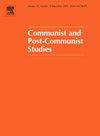Strengths and Vulnerabilities of Surviving Asian Communist Regimes from a Historical, Regional, and Holistic Approach
IF 1.3
4区 社会学
Q3 INTERNATIONAL RELATIONS
引用次数: 3
Abstract
In this article, I propose a historically grounded, regionally framed, and holistically constructed framework and make three interrelated claims about the strengths and vulnerabilities of surviving communist regimes in Asia. First, these regimes’ resilience today has historical origins in the communist revolutions that founded not only the regimes but also modern nations and states. This foundation provided these regimes with ideological, symbolic, and organizational assets that are now deployed to continue their dominance. Second, these regimes have been evolving together, have come to each other’s assistance at critical times, and have continued special relationships today; therefore, their strengths and vulnerabilities must be examined historically and regionally. Finally, in contrast to much existing scholarship that focuses only on resilience, I argue that factors contributing to their resilience also contain the very seeds of their vulnerabilities. I highlight three such factors, including extensive state control of resources, ruling parties’ ability to manipulate ideologies, and their formidable organizations—these three together carry not only their strengths but also their specific vulnerabilities today.从历史、区域和整体的角度看幸存的亚洲共产主义政权的优势和弱点
在这篇文章中,我提出了一个基于历史的、区域框架的和整体构建的框架,并对亚洲现存共产主义政权的优势和弱点提出了三个相互关联的主张。首先,这些政权今天的韧性有共产主义革命的历史根源,这些革命不仅建立了这些政权,而且建立了现代民族和国家。这个基础为这些政权提供了意识形态上的、象征上的和组织上的资产,这些资产现在被用来继续他们的统治地位。第二,这些制度一直在共同发展,在关键时刻相互援助,并在今天继续保持特殊关系;因此,必须从历史和区域角度审视它们的优势和弱点。最后,与许多只关注复原力的现有学术相反,我认为,促进他们复原力的因素也包含了他们脆弱的种子。我强调了三个这样的因素,包括国家对资源的广泛控制,执政党操纵意识形态的能力,以及他们强大的组织——这三个因素结合在一起不仅具有优势,而且具有当今特定的弱点。
本文章由计算机程序翻译,如有差异,请以英文原文为准。
求助全文
约1分钟内获得全文
求助全文
来源期刊

Communist and Post-Communist Studies
Multiple-
CiteScore
1.90
自引率
0.00%
发文量
23
期刊介绍:
Communist and Post-Communist Studies is an international journal covering all communist and post-communist states and communist movements, including both their domestic policies and their international relations. It is focused on the analysis of historical as well as current developments in the communist and post-communist world, including ideology, economy and society. It also aims to provide comparative foci on a given subject by inviting comments of a comparative character from scholars specializing in the same subject matter but in different countries.
 求助内容:
求助内容: 应助结果提醒方式:
应助结果提醒方式:


